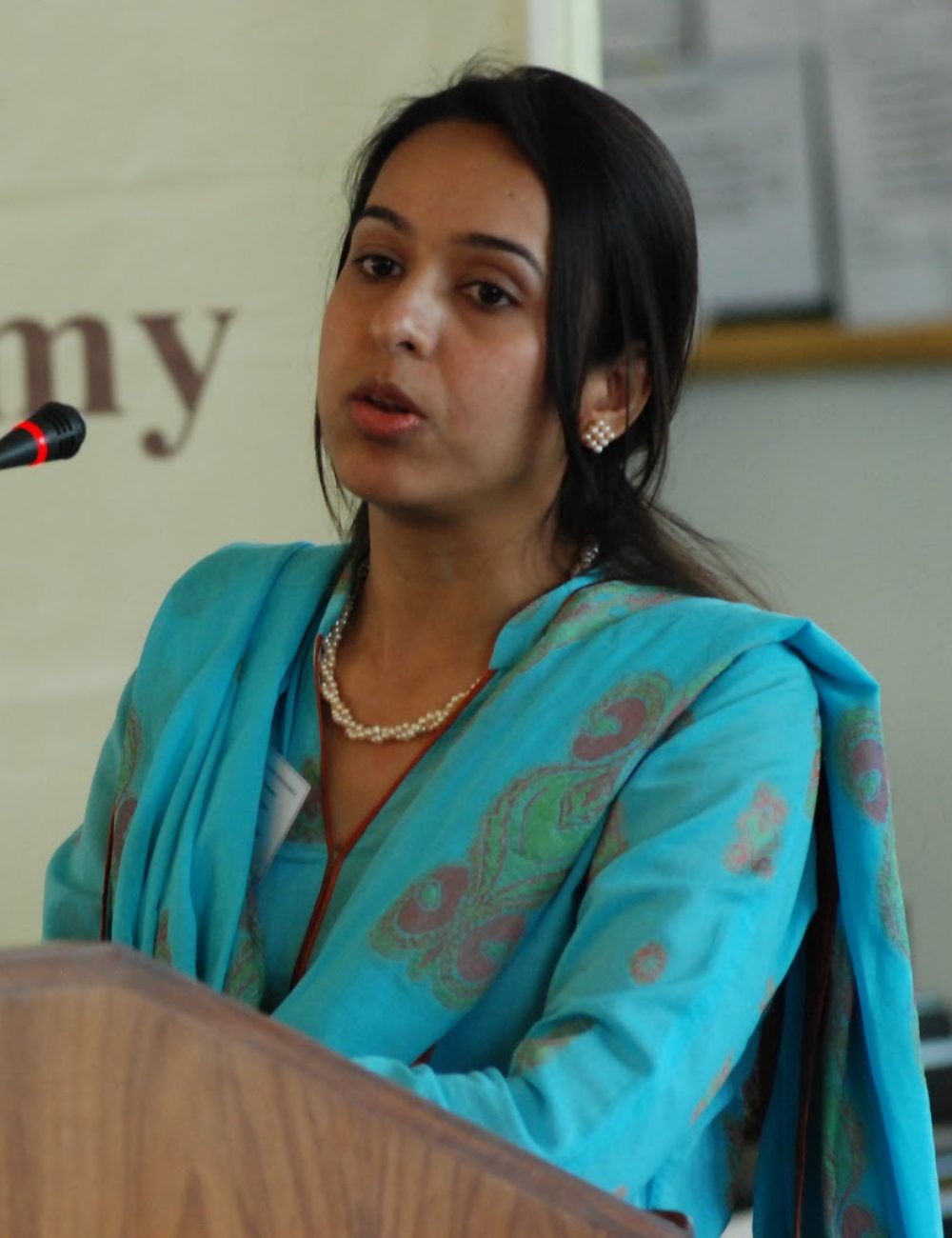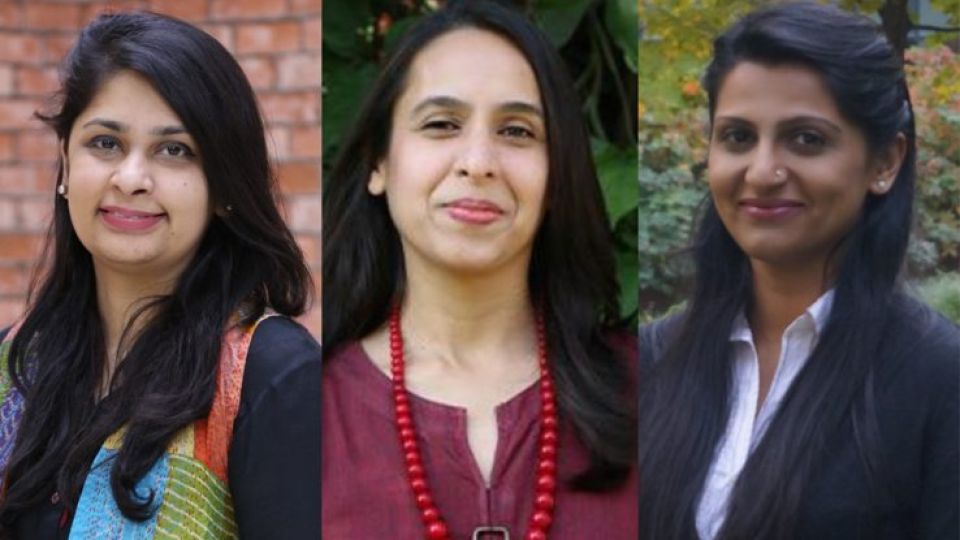March 29, 2022
ISLAMABAD — Economics is an indispensable way of understanding how societies work but women remain under-represented in the field.
Biases against women often deter their chances of breaking into the field and blazing through. However, despite such obstacles, many women have gone on to successfully carve a niche for themselves as economists. This March, we’re celebrating four Pakistani women economists who’ve made valuable contributions in their respective areas of specialisation.
Maha Rehman, Director Policy at Mahbub-ul-Haq Research Centre

Maha Rehman is Director Policy at Mahbub-ul-Haq Research Centre in LUMS. She has extensive experience in designing and executing evidence-based programmes, products and policies to improve service delivery and impact. Over the past two years, Rehman has actively engaged in multi-pronged analytical response to Covid-19 in Pakistan, tracking disease incidence and economic indicators, predicting outbreak, assessing impact on income, unemployment and remittances as well as evaluating the efficacy of various policies.
Prior to that, Rehman led research experiments and setup the Analytics Wing at Centre for Economic Research in Pakistan (CERP). She has also led research experiments at the World Bank in the fields of education, public finance and governance. She completed her graduate studies in Economics from Duke University in the United States and has an undergraduate degree in Economics and Mathematics from LUMS.
Rehman’s aspiration to become an economist stemmed from her childhood. “Growing up, I often heard my father — who was an electrical engineer leading various functions in the Lahore Electric Supply Company — remark how electricity shortage was a result of several factors beyond his control. This led to a feeling of moderate discomfort at not being able to understand the problem. The feeling was further accentuated when I picked up a newspaper and did not understand the business and economics section that seemed important. This led me to opt for Economics in A-Levels that was taught by a fantastic instructor, Mr Mumtaz Ahmed, who helped generate my interest in the field to an extent that it was impossible to give up this line of work and that interest only kept growing. My work at World Bank, CERP and more recently with new partners has only added fuel to this fire.”
Rehman has been fortunate to have gained “due respect and room to learn and thrive” at her alma mater, however not everyone has had the same positive experiences. It can be tough to be an economist in Pakistan. “Working as an economist in Pakistan is hard, not because of any bias stemming from male colleagues, who have only been supportive [in my case], but because of the general work culture across collaborations, partnerships and commitments,” she said. “Credibility has to be earned by working twice as hard and boundaries need to be pushed, bit by bit, to create more room.”
Does Rehman have advice for aspiring female economists? “Keep going!” she said. “No matter what the challenges, the work is exciting and rewarding. So let passion and hard work lead the way.”
Asma Hyder, dean and professor at IBA, Karachi

Dr Asma Hyder is dean and professor at the Institute of Business Administration (IBA), Karachi. She is a former member of the Planning Commission at the Ministry of Planning Development and Reform. She is also a recipient of the Fulbright J. William Award for International Understanding for a post-doctorate from the University of Pennsylvania (US). Hyder has been a visiting research fellow at the University of Sussex (UK), London School of Economics and Political Science (UK) and Carleton University (Canada).
Hyder’s research interests focus on development issues, specifically different labour market issues, wage differentials and schooling, gender, health and social well-being. She also studies household behaviour and preferences toward child schooling — as communities experience economic and climatic shocks — in the world’s most vulnerable and poorest societies. Her regional interests include Southeast Asia and Sub-Saharan Africa.
According to Hyder, there are fewer women than there are men in the field. Sadly, that’s a trend found in every field in Pakistan. “Female participation is enormously low in every discipline in Pakistan,” she said. “There should be mentorship programmes to encourage women to study macroeconomics, econometrics and firm theory. Understanding the core fields of economics will help women become a part of policy and decision-making circles at the national level, which ultimately affects households [in the country].”
Sabrin Beg, assistant professor at the University of Delaware, USA

Sabrin Beg is an Assistant Professor at the Alfred Lerner College of Business & Economics in the University of Delaware. She has a PhD in Economics from Yale University, her primary areas of expertise being development, economic history, political economy and applied microeconomics. Beg’s research spans projects in Pakistan, Bangladesh, Ghana and India.
Beg works as an academic economist. “I publish research on topics in economic development. My work involves understanding economic decision-making by agents in various roles — households, workers, public sector employees and politicians. Additionally, I teach undergraduate and PhD economics courses. I also advise students pursuing doctoral studies in economics and related fields.”
According to Beg, women who do opt for the field face various biases and challenges. “Dealing with bias starts with identifying it. Over the years, I have learned this from the valuable work of my colleagues and researched it on my own. We know from recent research that women in economics get significantly less credit than men for group work. My own research shows that managers have lower subjective ratings for female workers, even when those workers are objectively more effective. As part of my work, I perform in teams and also receive subjective performance assessments; these biases thus appear in my own professional experience. Being aware of them helps me deal with them, make others equally aware and advocate for myself.
Beg’s advise to aspiring female economists is to find role models and support. “Identify your role models, mentors and the people who will support you — and lean on them,” she said. “Don’t be afraid to ask questions and seek guidance. You know your abilities more than anyone else and you are the best marketer for yourself — don’t be modest about your achievements,” she said.
Hadia Majid, associate professor of economics at LUMS, Lahore

Dr Hadia Majid is an Associate Professor of Economics at LUMS. A Fulbright Scholar, she holds a PhD in Development Economics and an MA in Economics from The Ohio State University She’s also done an MSc in Economics from University of Warwick and a BSc in Economics from LUMS. Her work has been published in several international journals and she is currently editing a book titled Gender at Work in Pakistan. Her work has been funded by several agencies such as ESRC-DFID, IDRC, IGC, IFPRI and Oxfam among others. She has acted as a consultant for government and non-governmental agencies on gendered labour market outcomes.
“As an economist my objective is to investigate and understand human behaviour,” she said. “My research agenda considers how monetary and public resource constraints affect individuals in Pakistan. In particular, I explore effects of cash transfers, public goods provisioning, human capital acquisition in the context of intra-household decision making, and factors influencing women’s access to earned income. Here, I document and explore the barriers to women’s labour supply and their access to decent, empowering work.”
Talking about her journey towards becoming an economist, Majid said, “I took up economics in college and liked it from the very first course that I took. I was fortunate to have been taught by excellent professors who were adept at applying theory to the local context. I was hooked when I did field research in my third year in college though.”
She feels that while women have had a solid presence in the field historically, however “economics still sees far too few women entering the discipline”. “I think that the discipline suffers because of it, particularly when it comes to its policy outlook,” she said. “Consistently though, I find that with regard to the students that I teach, women are amongst the top performers. Many of them go on to graduate school, some for PhDs. I think that the numbers and the trends are changing gradually and I think there’s a lot more openness about and discussions happening today about the gendered experience and the inequalities within the discipline than was the case even a decade ago. I take this as a positive sign.
What’s her advise to aspiring economists? “My advice to those looking to enter academia is that it is hard in general and it’s especially hard to get funding and to get publications out,” she said. “You face a lot of rejection. However, there are now a lot more outlets. You just have to find the right fit and not be discouraged. To those interested in the discipline but not looking to enter academia, I think it’s worth keeping in mind that the discipline offers tools to understand human interactions, and the learning that it offers can be applied to any context. So don’t bind yourself to any specific industry. At the end of the day, it’s important to continue to expand your opportunity set, to acknowledge your constraints and identify the extent to which you can relax these, and to recruit support.”


